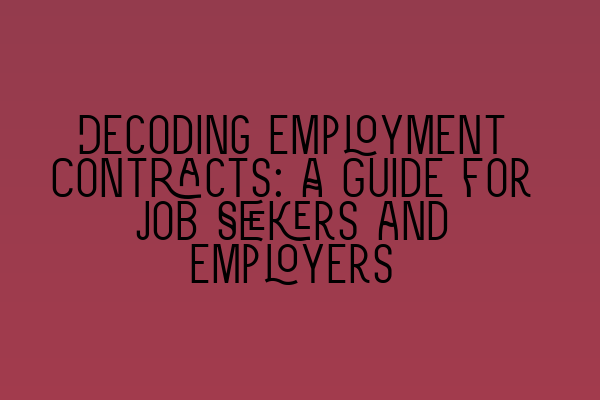Decoding Employment Contracts: A Guide for Job Seekers and Employers
When entering into an employment relationship, it is essential for both job seekers and employers to have a clear understanding of the terms and conditions that govern their working arrangement. Employment contracts serve as a legally binding agreement that outlines the rights, responsibilities, and obligations of both parties.
In this comprehensive guide, we will decode the complexities of employment contracts, providing invaluable insights for job seekers and employers alike. Whether you are about to enter into a new job or are an employer looking to create a fair and robust employment contract, this guide will equip you with the knowledge you need to navigate the legal landscape.
Understanding Employment Contracts
An employment contract is a legally binding document that sets out the terms and conditions governing the employment relationship between an employer and an employee. It provides clarity on key aspects such as job roles, working hours, remuneration, benefits, termination procedures, and dispute resolution mechanisms.
Employment contracts can vary in their complexity and scope. Some contracts may be simple, outlining only the essential terms, while others may be more detailed, including additional clauses to cover specific circumstances or protect the employer’s interests.
The Importance of Clarity in Employment Contracts
Clarity is crucial when it comes to employment contracts. A well-drafted contract helps both parties understand their rights and obligations, reducing the chances of misunderstandings, conflicts, and potential legal disputes.
For job seekers, understanding the terms of an employment contract is essential to make an informed decision about accepting a job offer. It allows them to evaluate whether the proposed terms align with their expectations and career goals. Additionally, a well-drafted contract can safeguard job security and provide a clear roadmap for career advancement.
For employers, having a clear and comprehensive employment contract protects their business interests. It enables them to set out the rights and responsibilities of employees, define the bounds of their authority, and establish mechanisms for managing performance and resolving disputes.
Key Elements of an Employment Contract
While employment contracts can vary, there are certain key elements that should be included to ensure clarity and legal compliance. These elements include:
1. Parties
The contract should clearly identify the parties involved – the employer and the employee. It is essential to include accurate and up-to-date contact information for both parties.
2. Job Title and Description
The contract should specify the job title and provide a clear and accurate description of the employee’s roles and responsibilities. This helps avoid any confusion regarding job expectations.
3. Remuneration and Benefits
The contract should outline the employee’s salary, payment frequency, and any additional benefits such as bonuses, healthcare, or pension plans. It is important to be transparent about the total compensation package.
4. Working Hours and Holidays
The contract should specify the normal working hours, including any flexibility or variations, and the allocation of holidays and vacation time.
5. Termination and Notice Periods
The contract should include provisions regarding the termination of the employment relationship, notice periods required by both parties, and any applicable severance arrangements.
6. Confidentiality and Non-Compete Clauses
Depending on the nature of the employment, the contract may include provisions regarding confidentiality, non-compete agreements, and intellectual property rights.
Seek Legal Advice
Given the legal complexities involved in employment contracts, it is highly recommended that both job seekers and employers seek legal advice to ensure compliance with the relevant laws and regulations. A qualified solicitor with expertise in contract law can review the terms of the contract, identify any ambiguities or unfair clauses, and provide guidance on possible modifications.
If you are a job seeker, consulting a solicitor can help you better understand your rights and negotiate fair terms with your prospective employer. For employers, engaging the services of a solicitor ensures that your contracts are legally robust, protecting your rights and minimizing potential risks.
Conclusion
Decoding employment contracts is essential for job seekers and employers to establish a fair and transparent working relationship. By understanding the key elements and seeking legal guidance, both parties can navigate the complexities of employment law, protect their interests, and foster a positive and productive work environment.
If you found this guide helpful, be sure to check out the following related articles:
- Top Resources for SQE Preparation: Tools to Help You Succeed
- SQE Mock Debrief Sessions: Analyzing Your Performance for Growth
- The Importance of Mocks in SQE Preparation: A Game Changer
- SQE Answer Keys: Unraveling the Mystery of Correct Answers
- Unveiling the Solicitors Qualifying Examination (SQE): What You Need to Know
